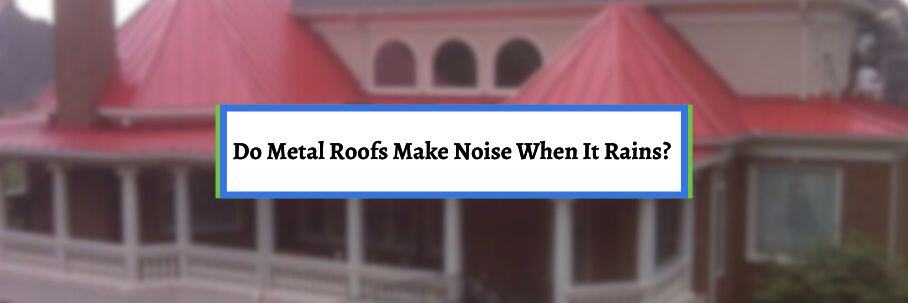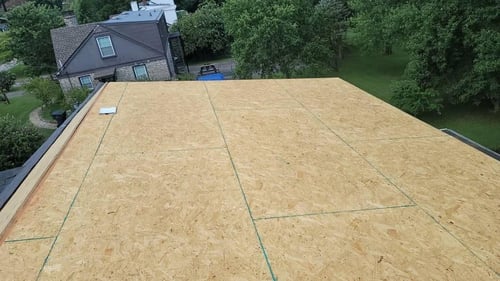Do Metal Roofs Make Noise When It Rains?

There are multiple things to consider when deciding if a metal roof is right for you. An often overlooked consideration is the noise factor when it rains.
This might not seem like a big deal, but there are plenty of instances where homeowners have buyer’s remorse for something this simple. That’s why every homeowner needs to think about how the noise would affect them when considering a metal roof.
The last thing you want after investing tens of thousands of dollars is a sound that drives you crazy, especially considering a metal roof lasts 30 to 50 years.
For over 30 years, Bill Ragan Roofing has helped homeowners make the right decisions with transparent and unbiased information. So, let’s break down what you need to know about the noise factor when getting a metal roof.
By the end of this article, you’ll have the answers to the following questions:
- Do metal roofs make noise when it rains?
- What can you do about a metal roof making noise when it rains?
- How much louder is a metal roof than other roofing materials?
Do metal roofs make noise when it rains?
Yes, metal roofs make noise when it rains. A light rain has been described as sounding like soft tapping/popping or leaves rustling, which some homeowners find soothing.
If it’s a normal rain shower, it’ll sound more like little beads hitting a hard surface. If it’s heavy rain, you’ll have a continuous echo throughout your home that sounds like a muffled drum roll.
The makeup of your home also affects how loud the noise is. An insulated attic space above a ceiling dampens the noise a bit.
If you have a two-story home, the bottom floor obviously won’t be as loud as the upstairs. And if your home has both, the noise will be dulled quite a bit.
But no matter what, a metal roof will always make some noise when it rains. So, you need to decide if it’s a deal breaker or something you can tolerate.
What can you do about a metal roof making noise when it rains?
Now you know there’s no way to stop rain noise on your metal roof. However, there are things you can do and add to help dampen the noise.
Let’s look at what you can do to help with the noise a metal roof makes when it rains.
Consider how different metal types absorb noise
Each metal type (aluminum, steel, copper, etc.) has different properties that impact how loud rain sounds. Aluminum is lighter, thinner, and more prone to vibration than other metals, which makes it the loudest option.
On the other hand, steel is quite effective at dampening noise because it’s thicker and denser than other metal roofing materials. Metals like copper and zinc are denser, heavier, and less resonant, which helps them absorb sound better than the other two.
While metal type plays a big role, so does the thickness of the metal panels. Thicker panels are more muted and absorb sound better than thinner panels.
Add a sound-reducing coating to the metal panels
Aluminum and steel metal panels come with a painted finish to protect the metal from the elements and prevent the color from fading. However, there are also coatings you can add to help reduce noise from rain.
They typically contain properties and fillers that absorb sound, such as rubberized compounds. Unlike the painted finish applied during manufacturing, these coatings are applied after installation.
While I understand they’re specifically designed to reduce noise, I don’t recommend them. I’m not saying there’s anything wrong with applying a sound-reducing coating, but I prefer finding other solutions.
Make sure the metal roof is installed over solid roof decking
The most important thing you can do to help with the noise is to make sure your roof decking is in great shape. If your metal roof is installed over solid decking, it will be quieter when it rains.

Solid wood (decking) between the metal panels and your ceiling dulls the noise, but not completely. Without a solid foundation, your ceiling’s insulation is the only thing to absorb the sound.
Underlayment (high heat ice and water shield) will also be installed over your roof decking before installing the metal roof. This added layer not only protects against leaks but also helps absorb some sound.
Add insulation boards over the decking
Solid decking helps absorb some of the sound, but you can add an upgrade to help even more. If a homeowner is worried about the noise, I always recommend installing wood fiber insulation boards between the roof decking and metal panels.

Adding these boards provides another layer sound has to travel through. Combined with solid roof decking and your ceiling’s insulation, insulation boards will reduce rain noise quite a bit.
However, adding the boards won’t completely block out the noise from a heavy downpour. Also, keep in mind that this upgrade will increase your metal roof’s cost.
Sound absorption is great, but energy efficiency and condensation prevention are also big reasons to consider adding insulation boards.
How much louder is a metal roof than other roofing materials?
You may think you’ll hear rain in your home no matter what type of roofing material you choose. While you may hear heavy rainfall on other roofs, metal roofing makes noise every time it rains.
Other roofing materials, such as asphalt, synthetic, and cedar shake, absorb sound much better than metal.
For example, a metal roof will be at least 50 decibels louder than an asphalt roof (the most common roofing material). Adding insulation boards could cut the noise in half, but not enough to dull it as much as asphalt shingles.
At the end of the day, a metal roof will always be louder than the other roof types. So, if the sound of rain is a big concern, a metal roof may not be the right roof for you.
Is a metal roof a good investment?
Now you know that your metal roof will make noise when it rains. Remember, you can’t completely block out the noise, but you can dampen it a little bit.
If you’re worried about how loud a metal roof is when it rains, just take the advice I mentioned here to dull it as much as possible. But if the noise is an absolute deal-breaker, it definitely isn’t the right roofing material for you.
Even though it must be considered, the noise factor hasn’t stopped metal roofing’s continued rise in residential roofing. This is simply because it has plenty of benefits worth dealing with the sound of rain.
However, you have to decide if the benefits make a metal roof a good investment. That’s why I wrote another article with the facts you need to make the right decision.
Check out Is a Metal Roof a Good Investment to continue learning if metal is the right roofing material for you.


